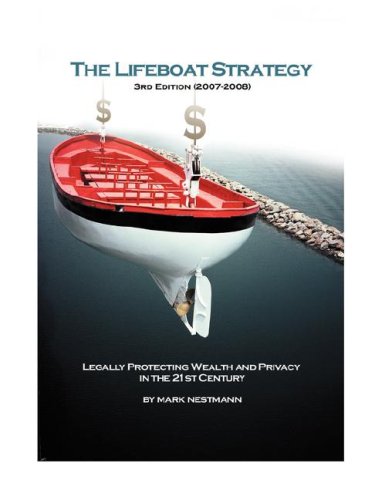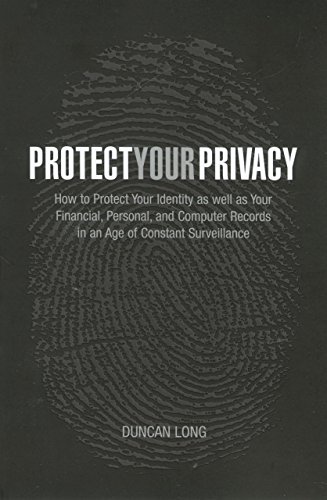Recently by Mark Nestmann: How Many Laws Have You Broken Today?
If someone could secretly stand behind you and monitor everything you’ve done on your PC, what would they discover about you that you would prefer to keep private? Thanks to new technologies that secretly track everywhere you go on the Internet, that’s an appropriate comparison of the threat you face unless you take advance precautions.
Perhaps you’ve never visited a Web site you wouldn’t want your spouse, your children, your neighbors, or the FBI to know about. Perhaps you really do have “nothing to hide.” But if you do, you’ll want to understand the threat to your privacy – and what you can do to protect yourself.
 The Lifeboat Strategy
Best Price: $45.58
Buy New $145.95
(as of 09:40 UTC - Details)
The Lifeboat Strategy
Best Price: $45.58
Buy New $145.95
(as of 09:40 UTC - Details)
The centerpiece of this threat is a tracking technology that records what Web sites you visit, what links you click on, and what types of search engine questions you ask. If you’ve entered personal information into applications that use these technologies, that data is stored as well. All of it is written to hidden directories on your hard disk. And there it stays – permanently – unless you know how to delete it.
Usually what’s recorded is innocuous. You might not mind that your hard disk has a record of the movies you’ve rented, the fact that you’re interested in photography, or that you want to take pilot lessons. And you might not object to the fact that the companies that create these hidden directories sell the information. For instance, a company selling photographic supplies would surely be interested in presenting an advertisement for its services to someone with a proven interest in photography.
However, perhaps your interests are a bit more controversial. Or even if they’re not, perhaps someone with access to your PC has less conventional preferences than you. In that event, the data in the hidden directories could possibly come back to haunt you, should your PC ever be compromised – or searched by law enforcement.
 Austria Money Secrets
Best Price: $40.00
Buy New $49.00
(as of 09:40 UTC - Details)
Austria Money Secrets
Best Price: $40.00
Buy New $49.00
(as of 09:40 UTC - Details)
Say, for instance, that you – or someone with access to your PC – watch a controversial video on the Internet. Guess what? The Web site serving up the video to your browser most likely plants a tracking beacon on your hard drive, where it stays – potentially, forever. Erasing “cookies” in your browser will NOT delete these beacons!
The largest offender in this regard is probably a program called Adobe Flash Player (AFP). Many Web sites use AFP to deliver audio and visual content. But AFP also creates a hidden directory on your hard disk to track the Web sites you visit, especially those with interactive or multimedia features. Companies that plant the beacons use them to personalize your browsing experience, and also sell the data they contain to direct marketing companies.
 Protect Your Privacy: ...
Best Price: $2.00
Buy New $3.78
(as of 04:55 UTC - Details)
Protect Your Privacy: ...
Best Price: $2.00
Buy New $3.78
(as of 04:55 UTC - Details)
Since you can’t delete these files from your browser, the most practical way to deal with them is to install a browser add-on program to manage and delete them. One such program is “Better Privacy,” an add-on for Firefox. You can download it here. I’ve configured Better Privacy to delete all AFP beacons when I shut down my browser.
I also suggest that you configure AFP to minimize tracking altogether. You can adjust its settings using a virtual control panel.
I’ve adjusted the settings on my PC to always deny access to my PC’s camera or microphone, never storing any content, and deleting all records of Web sites I’ve visited that use AFP. Those settings, together with the Better Privacy add-on, seem to have rid my PC of “beacons” – at least those from AFP. These settings limit functionality on some Web sites, but so long as you configure AFP to allow programs to ask you for permission to store content, you can control which ones have access to your PC. When you exit your browser, Better Privacy deletes them.
Incidentally, none of AFP’s tracking software violates any U.S. law; at least none of which I’m aware. And don’t look to the government for help – law enforcement agencies surely find beacons on your PC a highly informative tool to track your Web browsing behavior.
With big business and big government collaborating to invade your online privacy, you have only one resource to depend upon – yourself. So if you don’t want permanent records of your online life residing on your hard drive, don’t call your Congressman for help. You alone must take responsibility for protecting your online privacy.
September 2, 2010
Mark Nestmann is a journalist with more than 20 years of investigative experience and is a charter member of The Sovereign Society's Council of Experts. He has authored over a dozen books and many additional reports on wealth preservation, privacy and offshore investing. Mark serves as president of his own international consulting firm, The Nestmann Group, Ltd. The Nestmann Group provides international wealth preservation services for high-net worth individuals. Mark is an Associate Member of the American Bar Association (member of subcommittee on Foreign Activities of U.S. Taxpayers, Committee on Taxation) and member of the Society of Professional Journalists. In 2005, he was awarded a Masters of Laws (LL.M) degree in international tax law at the Vienna (Austria) University of Economics and Business Administration.





